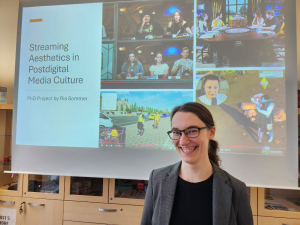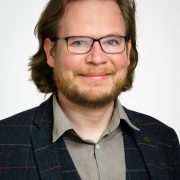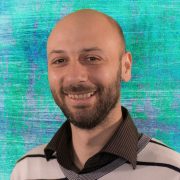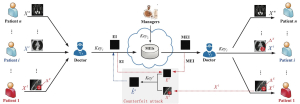On Febuary 25 2025, Felix Schniz held a talk titled “Mit Erfahrung lehren: Von Kafka, Spielen, und dem Erleben abstrakter Inhalte“ at the Conference Didaktik des TTRPG – Das ludonarrative Rollenspiel im Deutschunterricht in Cologne. His talk focused on the usage of video games and information technology didactics and their potential role in central European high school teaching contexts. The innovative methodologies developed and applied by the University of Klagenfurt, such as tech-focused Post-Mortem documentation from a humanities perspective, have been well received by the audience.
We are glad that the paper was accepted for publication at ICFEC 2025. ICFEC focuses on innovations in cloud and edge computing, bringing together researchers and practitioners to discuss emerging challenges and solutions.
Title: ADApt: Edge Device Anomaly Detection and Microservice Replica Prediction
Authors: Narges Mehran, Nikolay Nikolov, Radu Prodan, Dumitru Roman, Dragi Kimovski, Frank Pallas, Peter Dorfinger
Venue: 9th IEEE International Conference on Fog and Edge Computing 2025, in conjunction with CCGrid 2025, 19-22 May, 2025 – Tromso, Norway
Abstract: The recent shift towards increasing user microservices in the Edge computing infrastructure brings new orchestration challenges, such as detecting overutilized resources and scaling out overloaded microservices in response to augmenting requests. In this work, we present the ADApt using the monitoring data related to Edge computing resources, detecting the utilization-based anomalies of resources (e.g., CORE or MEM), investigating the scalability in microservices, and adapting the application executions. To reduce the bottleneck while using computing resources, we first explore monitored devices executing microservices with various requirements, detecting overutilization-based processing events, and scoring them. Thereafter, based on the memory requirements, ADApt predicts the processing requirements of the microservices and estimates the number of replicas running on the overutilized devices. The prediction results show that the gradient boosting regression-based replica prediction reduces the MAE, MAPE, and RMSE compared to other models. Moreover, ADApt is able to estimate the number of replicas for each microservice close to the actual data without any prediction and to reduce the utilization of the device.
The 15th International Conference on the Internet of Things (IoT 2025) is set to take place in late November 2025 in Vienna, Austria, organized by TU Wien. The conference will feature a research paper track, keynotes, workshops, and poster and demo sessions, all held in the unique “Kuppelsaal” of TU Wien. Dragi Kimovski from Klagenfurt University will serve as one of the Workshop Chairs, focusing on attracting high-quality workshops that drive innovation in IoT research. The conference aims to connect world-class researchers with industry experts to steer innovation across various IoT verticals, including smart industry, smart cities, smart health, and smart environments (iot-conference.org).
The 8th Workshop on Hot Topics in Cloud Computing Performance (HotCloudPerf 2025) will be held on May 5 or 6, 2025, in Toronto, Canada, in conjunction with the International Conference on Performance Engineering (ICPE). This workshop serves as a venue for academics and practitioners to discuss performance-related aspects of cloud computing across the computational continuum, from data centers to edge resources and IoT devices. Key topics include empirical performance studies, performance analysis using modeling and queuing theory, simulation-based studies, operational techniques for resource management, end-to-end performance engineering, and tools for monitoring cloud computing performance. Dragi Kimovski is one of the workshop organizers, playing a key role in shaping the event’s agenda and fostering discussions on cutting-edge cloud performance challenges. (hotcloudperf.spec.org)
The Third International Workshop on Intelligent and Adaptive Edge-Cloud Operations and Services (Intel4EC 2025) is scheduled for June 4, 2025, in Milan, Italy, as part of the 39th IEEE International Parallel and Distributed Processing Symposium (IPDPS). This workshop aims to bring together researchers, developers, and practitioners from academia and industry to present their experiences and research progress in AI/ML/LLM-enabled edge-cloud operations and services. Topics of interest include performance instrumentation, monitoring and observability, causal attribution and root-cause analysis, performance diagnosis and prognosis, and failure prediction and fault localization. Dragi Kimovski is one of the workshop organizers, contributing to the design of the program and topic selection. (intel4ec-workshop.nl)
Authors: Reza Farahani, Radu Prodan
Venue: Workshop on AI for Sustainable Energy Systems and Green AI, Brdo Estate, Slovenia, 11-12 March 2025
Authors: Fan Chen (Southwest Jiaotong University, China), Lingfeng Qu (Guangzhou University, China), Hadi Amirpour (Alpen-Adria-Universität Klagenfurt), Christian Timmerer (Alpen-Adria-Universität Klagenfurt), and Hongjie He (Southwest Jiaotong University, China)
Journal: ACM Transactions on Multimedia Computing Communications and Applications (ACM TOMM)
Abstract: Reversible data hiding in encrypted images (RDH-EI) has gained widespread attention due to its potential applications in secure cloud storage. However, the security challenges of RDH-EI in cloud storage scenarios remain largely unexplored.} In this paper, we present a counterfeiting attack on RDH-EI schemes that utilize block-permutation and Co-XOR (BPCX) encryption. We demonstrate that ciphertext images generated by BPCX-based RDH-EI are easily tampered with to produce a counterfeit decrypted image with different contents imperceptible to the human eye. This vulnerability is mainly because the block permutation key information of BPCX is susceptible to known-plaintext attacks (KPAs). Taking ciphertext images in telemedicine scenarios as an example, we describe two potential counterfeiting attacks, namely fixed-area and optimal-area attacks. We show that the quality of forged decrypted images depends on the accuracy of the estimated block-permutation key under KPA conditions. To improve the invisibility of counterfeit decrypted images, we analyze the limitations of existing KPA methods against BPCX encryption for 2×2 block sizes and propose a novel diagonal inversion rule specifically designed for image blocks. This rule further enhances the accuracy of the estimated block-permutation key. The experiments show that, compared to existing KPA methods, the accuracy of the estimated block-permutation key in the UCID dataset increases by an average of 11.5%. In the counterfeiting attack experiments on Camera’s encrypted image, we successfully tampered with over 80% of the pixels in the target area under the fixed-region attack. Additionally, we achieved a tampering success rate exceeding 90% in the optimal-region attack.
Tutorial title: Video Coding Advancements in HTTP Adaptive Streaming
Venue: IEEE International Conference on Multimedia & Expo (ICME) 2025 (https://2025.ieeeicme.org/tutorials/)
We are happy to announce that our tutorial “Video Coding Advancements in HTTP Adaptive Streaming” (by Hadi Amirpourazarian and Christian Timmerer) has been accepted for IEEE ICME 2025, which will take place in Nantes, France, June 30 – July 4, 2025.
Description: This tutorial provides a comprehensive exploration of the HTTP Adaptive Streaming (HAS) pipeline, covering advancements from content provisioning to content consumption. We begin by tracing the history of video streaming and the evolution of video coding technologies. Attendees will gain insights into the timeline of significant developments, from early proprietary solutions to modern adaptive streaming standards like HAS. A comparative analysis of video codecs is presented, highlighting milestones such as H.264, HEVC, and the latest standard, Versatile Video Coding (VVC), emphasizing their efficiency, adoption, and impact on streaming technologies. Additionally, new trends in video coding, including AI-based coding solutions, will be covered, showcasing their potential to transform video compression and streaming workflows.
Building on this foundation, we explore per-title encoding techniques, which dynamically tailor bitrate ladders to the specific characteristics of video content. These methods account for factors such as spatial resolution, frame rate, device compatibility, and energy efficiency, optimizing both Quality of Experience (QoE) and environmental sustainability. Next, we highlight cutting-edge advancements in live streaming, including novel approaches to optimizing bitrate ladders without introducing latency. Fast multi-rate encoding methods are also presented, showcasing how they significantly reduce encoding times and computational costs, effectively addressing scalability challenges for streaming providers.
The tutorial further delves into edge computing capabilities for video transcoding, emphasizing how edge-based architectures can streamline the processing and delivery of streaming content. These approaches reduce latency and enable efficient resource utilization, particularly in live and interactive streaming scenarios.
Finally, we discuss the QoE parameters that influence both streaming and coding pipelines, providing a holistic view of how QoE considerations guide decisions in codec selection, bitrate optimization, and delivery strategies. By combining historical context, theoretical foundations, and practical insights, this tutorial equips attendees with the knowledge to navigate and address the evolving challenges in video streaming applications.
Tutorial title: Serverless Orchestration on the Edge-Cloud Continuum: Challenges and Solutions
Venue: 16th ACM/SPEC International Conference on Performance Engineering (ICPE) (https://icpe2025.spec.org/)
We are happy to announce that our tutorial “Serverless Orchestration on the Edge-Cloud Continuum: Challenges and Solutions” (by Reza Farahani and Radu Prodan) has been accepted for ACM/SPEC ICPE 2025, which will take place in Torento, Canada, in May 2025.
On 16 January 2024, a special PhD presentation took place as a part of the ongoing open learning space organised by the master’s programme Game Studies and Engineering. Ria Sommer MA from the University of Osnabrück presented her ongoing research on Actual Play and Let’s Play practices. The event was moderated by Dr Felix Schniz BA MA and visited by students from various disciplines and AAU lecturers.






